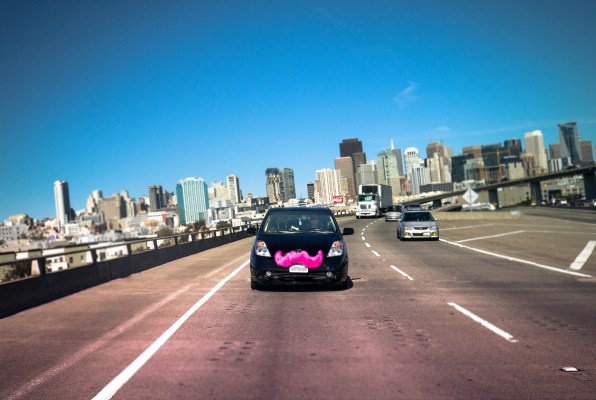Ride-sharing startup Lyft continues to grow, adding new markets where users can hail a ride via their mobile phones and have a mustachioed car pick them up. With the launch of service in Indianapolis, St. Paul and Atlanta, the company now has operations in 10 markets nationwide.
Today marks the first time that Lyft has announced service in more than one city, launching in three at once just ahead of the Labor Day Holiday weekend. As is its habit with new launches, the startup will have a “Mustache Parade” — whatever that is — in Indianapolis today at 11:30. And the service will be available in Atlanta and St. Paul beginning this morning for “friends and family” with full service launching Friday.
For Lyft, the launch expands it into a few smaller cities, but that’s by design — after adding service in tightly packed metropolitan areas like San Francisco, as well as some very large and sprawling cities like Los Angeles, the company wants to see what traffic patterns and logistics look like in less packed-in, less sprawling urban areas. The Midwest in particular is interesting to Lyft, as Chicago had been its fastest-growing new market to date.
At the same time that Lyft is launching in new cities, it’s also having its second Community Meeting, in which it gathers together drivers and passengers to rally support in one of its local markets. This time, the meeting is in Seattle in advance of a local city council meeting that will address peer-to-peer transportation next week. Seattle has been one of the markets that has been friendliest to ride-sharing startups, but these things are never a slam-dunk.
In California, Lyft, SideCar, and Uber received cease and desist notices from the local Public Utilities Commission last year, and it took some time for those companies to get the regulator to come around. But the PUC here has issued proposed regulations that could legitimize peer-to-peer transportation services in the state. If they are passed, those companies hope to take them to other jurisdictions as an example of a new regulatory framework for their services.
While Lyft has grown a lot over the past year since it officially launched in San Francisco, it’s still playing catch-up to Uber, which just raised $258 million in funding from Google Ventures and TPG. Uber also continues to launch in new cities, soft-launching in Dubai, Cape Town, and Bangalore this week alone. It now has service in more than 40 cities worldwide.
But Lyft hopes to expand quickly, as well. It has raised more than $75 million from Andreessen Horowitz and Founders Fund over the last nine months, and also added to its war chest, thanks to the acquisition of its legacy Zimride business by Enterprise Holdings. The company now has more than 100 employees, most of whom operate out of its headquarters in San Francisco.
